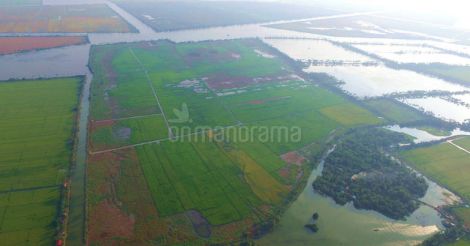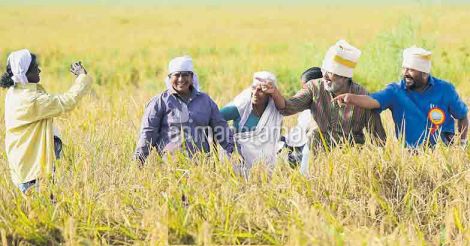Last Saturday, when the BJP was busy celebrating its election win in five states, a village in central Kerala was reaping the rewards of a green revolution initiated by the Communist government six months ago.
In a jubilant mood, the people of Kumarakom harvested the first batch of paddy cultivated in the controversial Metran kayal polder after a hiatus of eight years in the presence of two state ministers – V.S. Sunil Kumar and T.M. Thomas Isaac.
The government’s valiant battle with Dubai-based developers Rakindo to resume farming in the land, which had been let to lie fallow in the pretext of tourism development, was revolutionary.
The sprawling Metran kayal, with a history of over a century, hogged headlines last year when the then Congress-led UDF government, in a fatal move, gave sanction to fill the 400-odd acres of paddy fields for a controversial private sector tourism project. The government had to withdraw the order following stiff protest from various corners.
The LDF government and its young and energetic agriculture minister, V.S. Sunil Kumar, were quick to proclaim that they would resume paddy farming in the land.
The government kept its word. In a move that was eulogized by public, environmental-activists and intelligentsia alike, the government in November sowed the seeds of fresh hopes in 25 acres of land owned by 11 farmers, who did not bow down to the hectic offers from the Dubai company.
The movement gained momentum soon as civil society groups and farmers' collectives came forward to do farming in the rest of the land owned by the company, apparently registered in the name of several paper firms. Thus 315 of the 404 acres of land came under paddy farming, which has been shrinking in the state for years now.
It could be viewed as an act of encroachment but the government stood by the people and offered all support, including monetary funds and police protection. The government has spent over Rs 1.5 crore on the project, as per reports.
In the process of cultivation, the minister and other officials of the agriculture department had to face several legal cases, which are still subjudice.

"In spite of such false cases and malicious propaganda against us, the agriculture department would go ahead with paddy farming in Metran kayal," an emotionally charged Sunil Kumar said during the harvest. He went on to say that the government would transform Metran kayal into government land if arises.
The government's adamant stance vis-a-vis reviving paddy farming in the polder needs to be commended for various reasons. It sends out a strong message that the government is committed to reviving paddy farming at a time when the state is facing acute shortage of food grains, especially rice.
Successive governments have been making tall claims about reviving ailing agriculture sector in the state but this time the leaders kept their promises despite challenges from money-minded corporates. Such an adamant stance from a government undoubtedly moves the people and boosts the confidence of youngsters who have a passion for farming.
Going another step ahead, the government has also marketed the rice produced in the fields as 'Metran Kayal Brand' in a bid to ensure that the farmers get the dividends of their efforts.
Although it’s just a small step towards ensuring food safety, the Metran kayal model should also be viewed as a bold initiative in terms of environmental conservation. At a time when corporate interests, coupled with a wrong sense of development propagated by greedy politicians, are killing the paddy fields and water bodies in the state, Metran kayal stands out as a symbol of revival and resistance by the people.
(The views are personal)

























 Finance minister Thomas Isaac and agriculture minister Sunil Kumar pose as a woman tries to take their photo during harvest at Metran Kayal fields.
Finance minister Thomas Isaac and agriculture minister Sunil Kumar pose as a woman tries to take their photo during harvest at Metran Kayal fields.